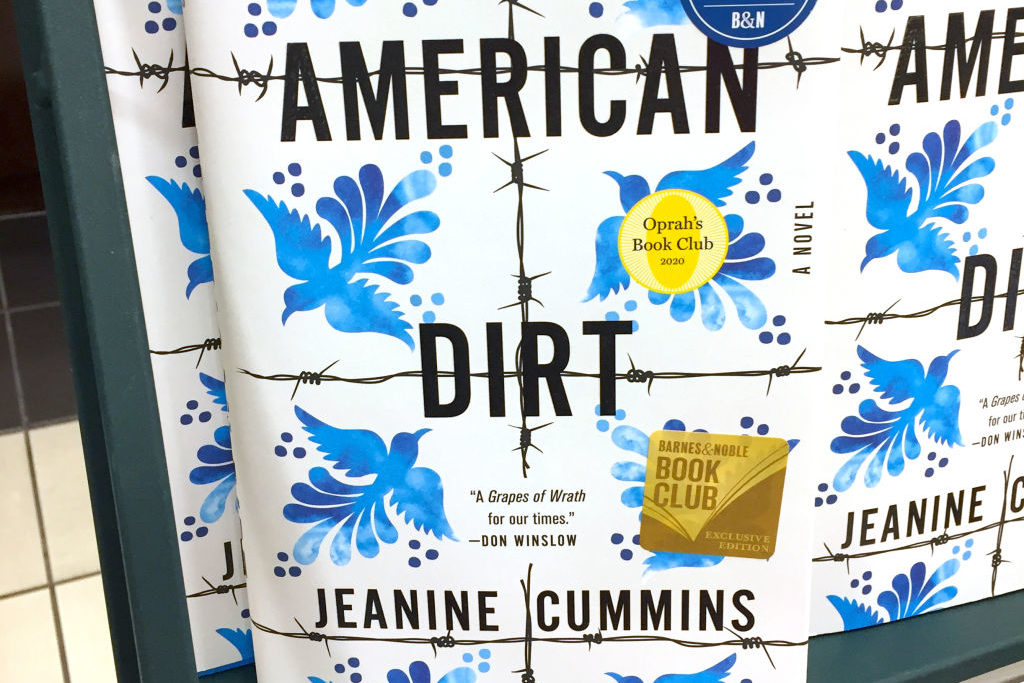Flatiron Books has canceled the promotional tour for Jeanine Cummins’s new novel American Dirt due to ‘safety concerns’. Cummins’s novel, which follows a Mexican mother and her young son as they flee cartel violence and seek asylum in the United States, is intended to spur readers’ sympathy at a time when Americans are increasingly indifferent to the plight of refugees. Instead she is the target of rancor and her book the target of censorship.
‘I’ve never in my life seen this kind of public flogging,’ said novelist Ann Patchett, defending Cummins even as other writers signed an open letter asking Oprah Winfrey to rescind her endorsement.
The outrage is following a familiar script. A white progressive takes a deep personal interest in the trauma of a people and culture not her own, writes a book about said people and gets crucified as a ‘white savior’, for daring to speak for people who should be allowed to speak for themselves. In Cummins’s case, it appears, some of her woke detractors are threatening more than figurative violence.
The celebrated memoirist Myriam Gurba, whose earth-scorching review of American Dirt launched the controversy, judges Cummins’s novel to be an artistic failure. Cummins’s misunderstands place and culture, Gurba says, and the novel’s protagonist ‘perceives her own country through the eyes of a pearl-clutching American tourist’.
Gurba has the critical tools and writer’s experience to judge American Dirt as literary realism. Her review is incisive and heartfelt, but it is also animated by resentment:
‘Cummins identified the gringo appetite for Mexican pain and found a way to exploit it. With her ambition in place, she shoved the “faceless” out of her way, ran for the microphone and ripped it out of our hands, deciding that her incompetent voice merited amplification.’
What matters to Gurba, ultimately, isn’t the book’s artistic failings, but its author’s identity.
In the New York Times, Jennifer Schuessler and Alexandra Alter call the controversy part of a larger ‘argument over art and cultural appropriation — how the stories of marginalized people should be told and who should be given the platforms to tell them’.
The stakes aren’t literal, but political: whose ideology gets to shape the moral imagination of the country –– and censor everyone else. Such control would be impossible were it not for progressives’ capture of the publishing industry which, having consolidated into five major conglomerates, essentially operates as a cartel. ‘Cancel culture’ has already manifested viciously within the young adult and children’s markets, with books cancelled before publication, removed from shelves after distribution or nuked by coordinated efforts to lower ratings on Amazon. The adult fiction market has long endured quieter forms of policing by gatekeepers. And that’s the real dirt on the American publishing industry.
‘[The left’s] approach to fiction was two-sided,’ explains conservative editor Adam Bellow. ‘Use their own stories and novels to advance their revolutionary aims, and prevent others from using that same descriptive and imaginative power for counterrevolutionary ends. It was an American version of what used to be called socialist realism.’
But the progressive coalition is hardly as coherent or single-minded as the Writers’ Union of the USSR, which itself suffered internal feuding as its members policed the boundaries of acceptable art and dispensed prizes and vacations on the basis of ideological purity. Still, the comparison is instructive: just as the Soviet literary establishment could not tolerate satire, so our progressive literati hate to see their sacred cows gored (or poorly rendered).
In Mikhail Bulgakov’s classic The Master and Margarita, written between 1928 and 1940, Satan comes to Moscow in the guise of a foreign professor and wages war on the Soviet literati. The comedy is blistering and the catharsis deep — as we might expect from an author who suffered censure and even proscription for being insufficiently dogmatic. Near the novel’s climax, Satan literally burns the literati’s meeting house to the ground. Even the novel’s structure, alternating between absurdist fantasy and fictionalized sacred history, offers a middle finger to the dry pieties of socialist realism. It is no wonder it wasn’t published during its author’s lifetime.
Havoc-wrecking satire is precisely what we need now to cut through today’s stultifying climate of literary progressivism, create space for ideological diversity and vent some of the steam that’s been building for years. The great satires of wokeness are waiting to be written — or, rather, waiting for an editor brave enough to pull the trigger. If none find the courage to take that risk, then all that steam will keep building, and a different sort of Devil will descend on New York publishing.
The late interdisciplinary scholar René Girard understood that we appropriate the desires of those with whom we identify. When the object of desire cannot be shared, rivalry ensues. That rivalry is intensified and reproduced mimetically, in symbols, images and language; left unchecked, conflict spreads like a contagion. In archaic societies, this ‘mimetic crisis’ was resolved through the scapegoat mechanism: the community turns unanimously against a single victim, whom it deems responsible for the crisis, and vents that rivalrous energy in murder. Over time this process is recapitulated in sacred ritual, the original victim having been deified for its power both to destroy and to heal. Girard had a name for the principle driving this process: Satan.
Satan, the ‘Accuser’, is the contagion that convinces a community of the victim’s guilt, transforming ‘people with distinct identities and roles into a hysterical mass’. Mimetic crisis can only be dispelled when a community genuinely believes in a victim’s guilt. But when a victim is known to be innocent, ‘social catharsis weakens and disappears. Instead of reconciling the community, the victimization must intensify divisions and dissensions.’
Literary prestige is a scarce commodity. Scarcer still are endorsements by Oprah Winfrey and priority access to a publisher’s publicity resources. It is only natural that the competition be intense. But it need not always lead to resentment. Jeanine Cummins may be guilty of writing a bad book. But she is not responsible for the publishing industry’s generation-spanning sin of denying a platform to the marginalized. Everyone knows this. Her scapegoating only exacerbates the already painful divisions in our literary institutions.
New York publishing faces a choice between two devils. It can take steps to depolarize by welcoming ideological diversity and even the satirical mischief of a Bulgakov. Or it can double-down on wokeness and welcome the far more destructive Satan of René Girard. Read on to find out what happens next.



















